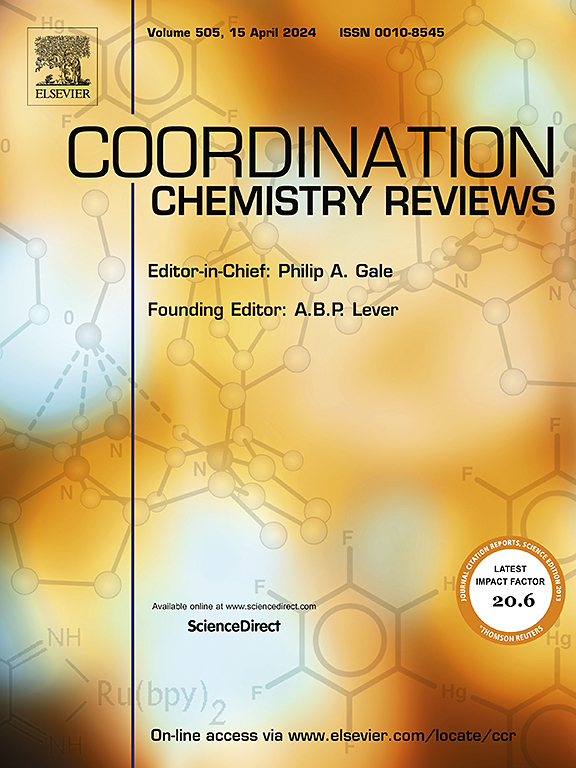Development and prospects of covalent organic framework-based ratiometric fluorescent sensors
IF 23.5
1区 化学
Q1 CHEMISTRY, INORGANIC & NUCLEAR
引用次数: 0
Abstract
Ratiometric fluorescence sensors attract more and more attention in the field of fluorescence sensors due to their excellent properties. The advanced material with high luminescent properties is the key to developing ratiometric fluorescence sensors. The covalent organic frameworks (COFs) stand out as an exceptional candidate for fluorescence sensing due to their expansive specific surface area and abundant active sites. However, the design, preparation, and application of COF-based ratiometric fluorescent sensors still represent a promising area for further development. This review collects the design principle of COFs and summarizes the design idea, sensing mode, and mechanism of COF-based ratiometric fluorescent sensors. Furthermore, the approaches to achieving a more comprehensive application of ratiometric fluorescent sensors with two emission centers are discussed. This review presents the research progress, challenges, and future directions in the field of COFs for fluorescent sensors, which is important for the development of high-performance ratiometric fluorescence sensors and the expansion of the application of COFs.
基于共价有机框架的比率荧光传感器的开发与前景
比率荧光传感器因其优异的性能在荧光传感器领域受到越来越多的关注。具有高发光特性的先进材料是开发比率荧光传感器的关键。共价有机框架(COFs)因其巨大的比表面积和丰富的活性位点而成为荧光传感的理想候选材料。然而,基于 COF 的比率荧光传感器的设计、制备和应用仍是一个有待进一步开发的前景广阔的领域。本综述收集了 COF 的设计原理,总结了基于 COF 的比率荧光传感器的设计思路、传感模式和机理。此外,还讨论了实现双发射中心比率荧光传感器更全面应用的方法。这篇综述介绍了用于荧光传感器的 COF 领域的研究进展、挑战和未来方向,对于开发高性能比率荧光传感器和扩大 COF 的应用范围具有重要意义。
本文章由计算机程序翻译,如有差异,请以英文原文为准。
求助全文
约1分钟内获得全文
求助全文
来源期刊

Coordination Chemistry Reviews
化学-无机化学与核化学
CiteScore
34.30
自引率
5.30%
发文量
457
审稿时长
54 days
期刊介绍:
Coordination Chemistry Reviews offers rapid publication of review articles on current and significant topics in coordination chemistry, encompassing organometallic, supramolecular, theoretical, and bioinorganic chemistry. It also covers catalysis, materials chemistry, and metal-organic frameworks from a coordination chemistry perspective. Reviews summarize recent developments or discuss specific techniques, welcoming contributions from both established and emerging researchers.
The journal releases special issues on timely subjects, including those featuring contributions from specific regions or conferences. Occasional full-length book articles are also featured. Additionally, special volumes cover annual reviews of main group chemistry, transition metal group chemistry, and organometallic chemistry. These comprehensive reviews are vital resources for those engaged in coordination chemistry, further establishing Coordination Chemistry Reviews as a hub for insightful surveys in inorganic and physical inorganic chemistry.
 求助内容:
求助内容: 应助结果提醒方式:
应助结果提醒方式:


